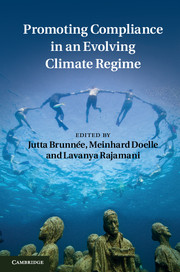Book contents
- Frontmatter
- Contents
- Contributors
- Preface
- Abbreviations
- Introduction: The role of compliance in an evolving climate regime
- Part I Context
- Part II The Kyoto compliance system: Features and experience
- Part III Compliance and the climate regime: Issues, options, and challenges
- 7 The role of non-state actors in climate compliance
- 8 Facilitation of compliance
- 9 Enforcing compliance in an evolving climate regime
- 10 Financial mechanisms under the climate regime
- 11 Post-2012 compliance and carbon markets
- 12 Compliance and the use of trade measures
- 13 ‘Comparability of efforts’ among developed country parties and the post-2012 compliance system
- 14 From the Kyoto compliance system to MRV
- 15 Compliance in transition countries
- 16 Developing countries and compliance in the climate regime
- 17 The role of dispute settlement in the climate regime
- 18 Depoliticizing compliance
- Part IV A look forward
- Bibliography
- Index
- References
9 - Enforcing compliance in an evolving climate regime
Published online by Cambridge University Press: 05 January 2012
- Frontmatter
- Contents
- Contributors
- Preface
- Abbreviations
- Introduction: The role of compliance in an evolving climate regime
- Part I Context
- Part II The Kyoto compliance system: Features and experience
- Part III Compliance and the climate regime: Issues, options, and challenges
- 7 The role of non-state actors in climate compliance
- 8 Facilitation of compliance
- 9 Enforcing compliance in an evolving climate regime
- 10 Financial mechanisms under the climate regime
- 11 Post-2012 compliance and carbon markets
- 12 Compliance and the use of trade measures
- 13 ‘Comparability of efforts’ among developed country parties and the post-2012 compliance system
- 14 From the Kyoto compliance system to MRV
- 15 Compliance in transition countries
- 16 Developing countries and compliance in the climate regime
- 17 The role of dispute settlement in the climate regime
- 18 Depoliticizing compliance
- Part IV A look forward
- Bibliography
- Index
- References
Summary
Introduction
Recent decades have seen a remarkable proliferation of sophisticated and innovative legal arrangements to protect the global environment; yet major pressures on the biosphere and its alarming rate of deterioration continue largely unabated. Not surprisingly, enforcement is therefore considered an Achilles’ heel of international environmental law. The current regime lacks a central, overarching body to ensure enforcement; instead relying on domestic compliance by the very nations it seeks to commit.
Climate governance is no exception. The mitigation of climate change is a prime example of a collective action problem. It reveals the precarious balance between strong commitments and effective enforcement: efforts to achieve safe greenhouse gas concentrations in the atmosphere will fail unless there is a means of coercion or an incentive that is unavailable to non-participants. Yet, aside from the relatively limited options provided by the law of state responsibility, sovereign states cannot be coerced without prior consent. In turn, the expectation of strict enforcement may undermine their willingness to enter into meaningful substantive commitments. If the international community decides to intensify its cooperative efforts with deeper and more ambitious commitments, enforcing the latter will become an ever greater challenge.
- Type
- Chapter
- Information
- Promoting Compliance in an Evolving Climate Regime , pp. 194 - 215Publisher: Cambridge University PressPrint publication year: 2011



